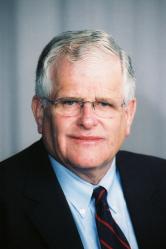On June 21, 2019, Brookings Vising Fellow Russell Wheeler testified at a hearing of the House of Representatives Judiciary Subcommittee on Courts, Intellectual Property, and the Internet. Wheeler argued in his testimony and response to members’ questions that:
1. The U.S. Supreme Court should create a code of conduct to serve, as does the Code of Conduct for United States Judges, as a guide to ethical behavior, not as a disciplinary mechanism. The Court should create the code of its own volition. Legislative proposals to have the United States Judicial Conference prepare a conduct code for the Supreme Court runs counter to the statutorily created governance structure of the federal judiciary. Imposing a disciplinary mechanism on Supreme Court Justices similar to the mechanism that Congress has created for other federal judges would be “a cure worse than the disease.”
2. Generally, federal judges should provide the reason or reasons for which they deny motions that they recuse themselves in particular proceedings, but disclosure policies should make an exception in the case of disclosure for sua sponte recusals for non-financial reasons (such as potentially embarrassing matters involving the judge, her family, and third parties).
3. The U.S. Judicial Conference’s policy of release on request, and after redaction, of judges’ statutorily required financial disclosure statements is reasonable.
4. Proposals to require judges to place their financial holdings in blind trusts runs counter to the federal judicial disqualification statute’s mandate that judges keep themselves informed about their “personal and fiduciary financial interests.”
Wheeler noted with approval the observation in the Code of Conduct for U.S. Judges that judges should expect to be the subject of constant public scrutiny and should accept willingly restrictions that other citizens would find burdensome. But those restrictions should not be so obtrusive as to discourage qualified individuals from entering or remaining in judicial service. Balancing those competing interests is a difficult task.
To read his full testimony, click here.
The Brookings Institution is committed to quality, independence, and impact.
We are supported by a diverse array of funders. In line with our values and policies, each Brookings publication represents the sole views of its author(s).




Commentary
TestimonyJudiciary in the 21st century: Ideas for promoting ethics, accountability, and transparency
June 27, 2019